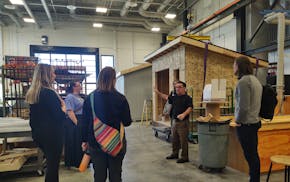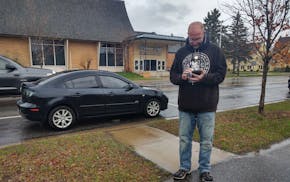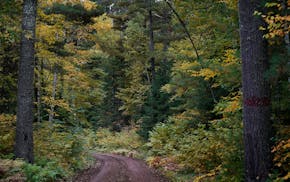CLITHERALL, MINN. – Once in a while, on a summer afternoon, my husband will ask if our young son and I are ready to help with the small square hay bales.
Hardly anybody makes small square bales anymore. Their day is over. Square balers have gone the way of the typewriter and the rotary dial phone, replaced by the big round bales that occupy Minnesota's shorn hay fields like an old master scene.
"Big rounds," we cleverly call them. Weighing 1,000 pounds or more, they are cut and baled and hauled off the field by one person — an accomplishment unthinkable before 1971, when the first big round baler was introduced. It was one of the breakthrough inventions that revolutionized American farming.
Big rounds make sense in industrial agriculture. My husband bales those, too. But baling big rounds is a solitary task, a commentary on the isolation gripping America today, and my heart is with the small squares that we gather by hand, inefficiently, but together, as a family.
My husband makes small squares the old school way, leaving the bales scattered across acres of ground, and alongside our son, we heft them up and sling them onto the hay rack for stacking. This is how it used to be done when farm families had eight or 10 or 12 kids and labor was plentiful, back when hay baling and straw baling and mucking calf pens added muscles to farm kids in time for fall football.
Then family sizes shrunk and farms grew. Farmers stopped calling themselves farmers and became agricultural producers and if they still baled small squares, they used equipment that spit them directly from the baler onto a rack and dropped them inside a shed.
Big rounds end up at sizable livestock operations, mostly. But sometimes someone without a tractor needs small bales they can throw to their horses. That's when my husband will attach the small square baler to his tractor and rumble through the hay field, chunking out small square after small square.
Then it's time for our son and me to climb on the hay rack. The weather-worn wooden slats shift beneath us and we dig our fingers between them to hang on while going up a hill. With every bounce and every turn, the slats squeak against the wooden braces.
We pass sloughs and oak groves, deer stands and duck ponds. Then there they are, the ragged bales bound with twine, waiting to be hefted onto the hay rack. I'm no farmer or athlete. I'm a writer. I eat candy and sit at my laptop, writing. My body tells the sorry tale. For every bale I hoist, my husband lifts and stacks two or three. But I love the physical work that leaves no time for worry or indecision. You know your job. It's well defined. Grab a bale by the twine. Grunt. Stagger to the rack. Swing it up and into place. Repeat.
As my husband drives the tractor across the field, our seats on the hay rack climb higher and higher. We clamber up the wall of bales to the top and we're off to the next pile. I keep an eye on our son, make sure he doesn't get too close to the edge. Above us there's the clear blue sky. Eagles or hawks turn above us. The dried hay makes us itch but at least we're not numb from sitting at screens. We're up and down the hay rack, pausing to gulp water, then at it again.
None of the bales weighs the same, but each is somewhere between 40 and 60 pounds. Their weight depends on where they grew, how fertile the soil was in that spot, whether it got enough rain and how dry the hay is. Maybe big farmers are able to adjust their soil conditions well enough to produce perfectly uniform bales, but we're the little guys. It's not a full-time farm. My husband fixes tractors and other vehicles in his on-farm shop. It's rare for little guys to make a living solely from farming.
The sun has dwindled by the time the hay rack is full. We lie on the topmost level on our backs, watching the moon and the tree branches slide by overhead. That's when I get a moment to think about how different my life is now from the years I spent growing up in Plymouth on a paved road, near Ridgedale Mall and walking distance to Sunset Hill Elementary School and Ridgemont Junior High. I've made the reverse journey of my grandparents, moving away from the city, not to it, without a single regret.
And always, every time my son and I are called upon to help with small squares, I feel gratitude for living on an inefficient small farm, where working side by side under a hot summer sun is its own reward.

Tolkkinen: Fergus Falls priest who studied with Pope Leo says he has good hearing 'to hear everyone'

Tolkkinen: Just when I was starting to lose myself in nature's grandeur, along came a motorcycle

Tolkkinen: On a three-day northern Minnesota tour, the grit and glory of our state became clear

Tolkkinen: Brainerd City Council should spend a night, or 30, sleeping outdoors


